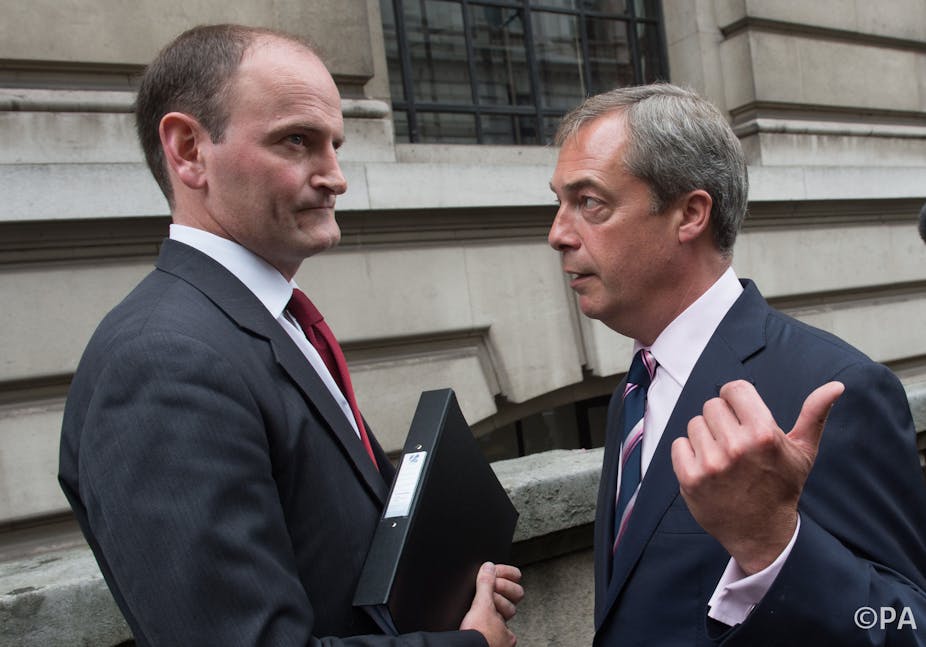“Let’s see if we can make history”, said Conservative MP Douglas Carswell after he announced that he was defecting to UKIP and resigning his seat in Clacton to fight a by-election for his new party.
But if we’re talking history, we might as well look at what the past tells us about the fate of insurgent parties in British politics.
Most people have forgotten about the socialist Common Wealth Party, but it gained considerable traction during the special political conditions of World War II.
Three MPs were elected in by-elections during the war but only one – Ernest Millington – survived the 1945 general election. The party soon split and dissolved, although it lasted as a pressure group until 1993.
We could also look at the more recent example of the Social Democratic Party, formed in 1981 by the so-called Gang of Four, made up of defectors from the Labour Party. The best known was Roy Jenkins, who held the offices of Chancellor and Home Secretary (twice) in Labour governments, as well as serving as president of the European Commission. Almost all its initial MPs were Labour defectors and only one Conservative MP joined them.
The year the SDP was founded, Shirley Williams won a by-election in the constituency of Crosby near Liverpool. This had previously been one of the safest Conservative seats in the country. She secured 49% of the vote, but lost the seat in 1983. The Social Democrats entered an “alliance” with the Liberals in the 1983 general election, but their advance in votes was not matched by a significant number of seats in the House of Commons. They won places for just 23 MPs.
In 1988 they merged with the Liberals to form the Liberal Democrats, although three Social Democrat MPs, including Gang of Four member David Owen, refused to join the new party. Owen eventually wound up the SDP in 1990. Charles Kennedy, who had been elected as a Social Democrat, eventually became leader of the Liberal Democrats.
The Social Democrats were a centrist party and launched an appeal to voters on that basis. At the time, the Conservative Party was perceived to have moved to the right under Margaret Thatcher and the Labour Party was seen as having moved to the left under the leadership of Michael Foot. This opened up an unoccupied space in the middle of the political spectrum.
UKIP is more difficult to characterise in conventional left-right terms, although many analysts would see it as being on the populist right. It certainly appeals to those who have been left behind in economic and cultural terms by the effects of globalisation and its supporters tend to be more male, more elderly and less well educated than the population as a whole.
Old lessons for new friends
These uprisings ultimately failed to produce meaningful gains in the House of Commons but they had long-lasting repercussions nonetheless. UKIP is the most successful insurgent party since the Social Democrats in terms of polling and has had more success than the Social Democrats ever had in European elections. They are, of course, very different political parties, but the odds remain stacked against insurgents.
The story of the Social Democrats – and indeed the Common Wealth Party – shows how difficult it is for a break away party to make it big in Britain but it also suggests that these small parties can shape politics in other ways.
The greatest effect of the Social Democrats was on the Labour Party, even if many Labour supporters wouldn’t like to admit it. Its electoral success encouraged Neil Kinnock to begin the process of reforming the party and moving it in a more moderate direction. This process was continued by John Smith and then accelerated by Tony Blair with New Labour. Many criticisms have been made of New Labour, not least of its foreign policy, but it certainly offered a successful electoral formula.
UKIP may have some advantages over the Social Democrats. It is a genuinely popular insurgent movement that is bottom up rather than top down. That sometimes creates difficulties with maverick individuals making contentious statements but it does mean that there is an enthusiastic activist base. What’s more, the two main parties are less dominant than they were in the 1980s and voters are increasingly willing to vote for an alternative, not just in by-elections, local elections or European Parliament elections.
Farage, Carswell and friends may find that their real impact will be on the Conservatives. There are many Conservative MPs and activists who blame David Cameron for not winning the 2010 election outright and having to form a coalition government. Many of them also think he is too moderate, particularly over Europe.
That doesn’t mean that they will split in the way they did over the Corn Laws in the 19th century which saw them out of office for nearly 30 years but this defection will certainly make them sit up and pay attention.

